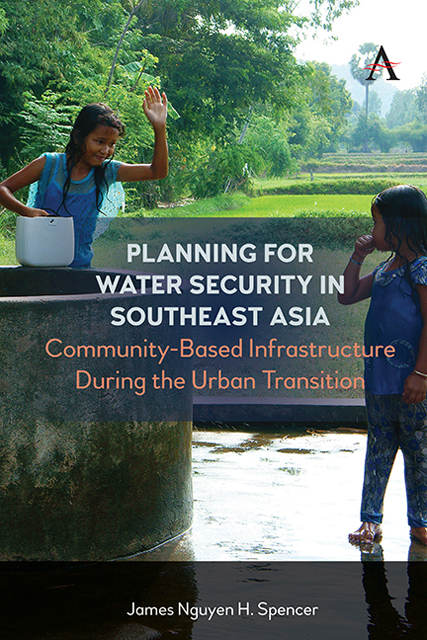 Planning for Water Security in Southeast Asia
Planning for Water Security in Southeast Asia Published online by Cambridge University Press: 10 January 2023
As the urbanization of the globe draws together increasingly populous and dense agglomerations of human activity, a mutual interdependence in constrained spaces requires shared infrastructure, both tangible and intangible. The physical and mental shifts required of individuals transitioning from an agrarian to an urban life are significant. While agrarian communities certainly work as mutually dependent collectivities, establishing long-term work-sharing arrangements and natural resource management regimes and practices that both sustain the local economies and ecologies and solve numerous collective problems, these ties are often broken with the added pressures of density. That is, the objectives and problems to be solved through collective action can change substantially from rural to urban situations. Throwing trash out of the window in the city, for example, has always had much greater social impact than doing so in a rural setting. This fact suggests that previously rural populations moving to urban communities must develop new associations, institutions and relationships based on a new set of collective challenges. Gone are the needs for collective irrigation for agricultural production in relatively large spaces; in their place are the distinct needs for collective management of household water supplies and environmental pollution in relatively cramped quarters.
The confluence of individuals in constrained urban space both creates the daunting challenge of compromise with numerous new groups, often simultaneously, and at the same time creating the opportunity of significant new economies of scale not present in agrarian communities more dispersed among environmental resources. Even when cities face the challenge of developing better ways of coordinating the actions among millions of individual actors and thousands of communities, they are comforted in knowing that if they are able to solve these city-wide collective-action problems, they stand to reap the rewards of huge per-person reductions in cost and, as we will see in the case studies, citizens committed to the goal of improving the life of the collective. These cost and efficiency gains due to density are not just financial. The dense urban form vastly increases the density of human interactions and transactions of residents, leading to community-level associations on almost every aspect of life: economic, cultural, social and political.
Urbanization of the Agrarian South: An Urban Transition
The urban transition is most visible in the large agrarian regions of the world. SSA and SEA differ in terms of history, language, culture and positions in the contemporary global economy. Nevertheless, they share important historical legacies that inform contemporary development debates surrounding urbanization.
To save this book to your Kindle, first ensure [email protected] is added to your Approved Personal Document E-mail List under your Personal Document Settings on the Manage Your Content and Devices page of your Amazon account. Then enter the ‘name’ part of your Kindle email address below. Find out more about saving to your Kindle.
Note you can select to save to either the @free.kindle.com or @kindle.com variations. ‘@free.kindle.com’ emails are free but can only be saved to your device when it is connected to wi-fi. ‘@kindle.com’ emails can be delivered even when you are not connected to wi-fi, but note that service fees apply.
Find out more about the Kindle Personal Document Service.
To save content items to your account, please confirm that you agree to abide by our usage policies. If this is the first time you use this feature, you will be asked to authorise Cambridge Core to connect with your account. Find out more about saving content to Dropbox.
To save content items to your account, please confirm that you agree to abide by our usage policies. If this is the first time you use this feature, you will be asked to authorise Cambridge Core to connect with your account. Find out more about saving content to Google Drive.